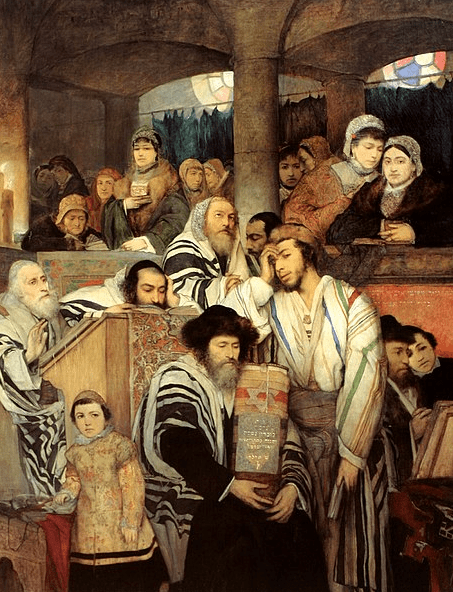Shalom! We’re tracing the roots of some of the most common Jewish last names found in the world today. Learn more about your Jewish heritage by tracing the meaning and origin of your Jewish last name.

The history of the Jewish people is punctuated with periods of immense suffering and persecution. From their beginnings as slaves to the Egyptian pharaohs, to their Babylonian Exile, and up to the siege of Jerusalem and the destruction of the Temple by the Romans, the Twelve Tribes of Israel had remained in the same relative geographical area. This, however, ended after the Roman conquest and the Great Diaspora (as it would become known) scattered the Jewish population around the globe.
By the Middle Ages, the majority of the Jewish people had settled in two distinct areas: the lands of the Holy Roman Empire in today’s Germany, Austria and Poland; and on the Iberian Peninsula, modern Spain and Portugal. These two groups became known as Ashkenazi and Sephardic Jews, respectively, and had very little to do with one another. The two groups established diverging cultural traditions which would later be reflected in their last names.
Naming Conventions: Hebrew Surnames
As last names were not a necessity, or even a consideration, in many ancient cultures, Jewish last names were often only used as a point of pride of parentage or religious lineage.
Patronymic last names: Before political repressions and societal norms resulted in many Jewish people adopting European last names, there were patronymic Hebrew surnames, some of which are still around today. The name ben, meaning “son of,” and bat, or “daughter of,” followed by their father’s name became the first established Hebrew surname tradition.
Lineage – priestly groups: If people held religious offices their name often denoted this. The two most common groups of Hebrew surnames denoting religious lineage are Cohen and Levi. Variations of the Cohen last names include Cohn, Katz, Kohn, Kogan, Kahane, Kahneman, and Kaplan. The second group, the Levites, were people who worked alongside priests in ancient Jerusalem. Common variations include Levine, Levitt, Levitas, Lewin, and Lewinson.
Ashkenazi Surnames
The Ashkenazi Jews, or those who settled in Northern and Eastern Europe, adopted the tradition of surnames common with their European neighbors. Many Ashkenazi surnames followed the geographical and occupational signifiers that were in vogue at the time, while many others drew upon the pre-Christian tradition of descriptive surnames.
However, as Erika Gottfried wrote us when she read this article (see her note below, including a link for more information), some of these name changes were caused by state intervention.
Some common Ashkenazi surnames include:
- Goldberg: meaning the people from the “town of Gold” in medieval Poland
- Schneider: German for the occupation “tailor”
- Geller: a Yiddish name denoting the blonde or yellow coloring of hair
It is interesting to note that many common Jewish last names found among the Ashkenazi are not occupational, geographical, or descriptive. Instead, many are colors or the names for precious stones. As a result, common Jewish surnames around today include Green, Gold, Goldman, and Weiss.
Sephardic Surnames
In 1492 the King and Queen of Spain signed an order to force Sephardic Jews to register themselves before their subsequent expulsion from the Iberian Peninsula. As a result, many adopted Spanish last names to avoid detection by the Spanish Inquisition. Many others who were forced into exile in Northern Africa adopted Arabic and Turkish last names due to similar repressions.
Common Jewish Last Names & Their Meanings
Search your last name and uncover the surname meaning to learn more about your family history. Some common Jewish last names include:
- Abrams: the name Abrams and its derivatives harken back to Abraham, the patriarch of the Jewish people.
- Blau: one of the common Jewish last names that is a color, Blau means “Blue” in German.
- Horowitz: a geographical Jewish surname, Horowitz describes someone from the Jewish community of Horovice in the modern-day Czech Republic.
- Lieb: a descriptive surname that means “Lion,” Lieb gives us the glorious impression of an ancestor who was, in their time, both brave and mighty.
- Roth: meaning “Red,” Roth is another Jewish last name that uses color, though it may also be used as a descriptor either for hair or complexion.
Your Jewish last name is a link to your past, a window into your people and the ancestors that came before you. If you have Jewish American roots, you can trace your family history using Jewish American newspapers.
Explore over 330 years of newspapers and historical records in GenealogyBank. Discover your family story! Start a 7-Day Free Trial
Source:
Related Articles:
